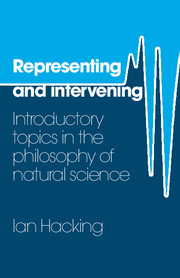Book contents
- Frontmatter
- Acknowledgements
- Contents
- Analytical table of contents
- Preface
- Introduction: Rationality
- Part A Representing
- 1 What is scientific realism?
- 2 Building and causing
- 3 Positivism
- 4 Pragmatism
- 5 Incommensurability
- 6 Reference
- 7 Internal realism
- 8 A surrogate for truth
- Break: Reals and representations
- Part B Intervening
- Further reading
- Index
- Frontmatter
- Acknowledgements
- Contents
- Analytical table of contents
- Preface
- Introduction: Rationality
- Part A Representing
- 1 What is scientific realism?
- 2 Building and causing
- 3 Positivism
- 4 Pragmatism
- 5 Incommensurability
- 6 Reference
- 7 Internal realism
- 8 A surrogate for truth
- Break: Reals and representations
- Part B Intervening
- Further reading
- Index
Summary
Pragmatism is the American philosophy founded by Charles Sanders Peirce (1839–1914), and made popular by William James (1842–1910). Peirce was a cantankerous genius who obtained some employment in the Harvard Observatory and the US Coast and Geodesic survey, both thanks to his father, then one of the few distinguished mathematicians in America. In an era when philosophers were turning into professors, James got him a job at Johns Hopkins University. He created a stir there by public misbehaviour (such as throwing a brick at a ladyfriend in the street), so the President of the University abolished the whole Philosophy Department, then created a new department and hired everyone back – except Peirce. Peirce did not like James's popularization of pragmatism, so he invented a new name for his ideas – pragmaticism – a name ugly enough, he would say, that no one would steal it. The relationship of pragmaticism to reality is well stated in his widely reprinted essay, ‘Some consequences of four incapacities’ (1868).
And what do we mean by the real? It is a conception which we must first have had when we discovered that there was an unreal, an illusion; that is, when we first corrected ourselves. … The real, then, is that which, sooner or later, information and reasoning would finally result in, and which is therefore independent of the vagaries of me and you. […]
- Type
- Chapter
- Information
- Representing and InterveningIntroductory Topics in the Philosophy of Natural Science, pp. 58 - 64Publisher: Cambridge University PressPrint publication year: 1983
- 1
- Cited by



